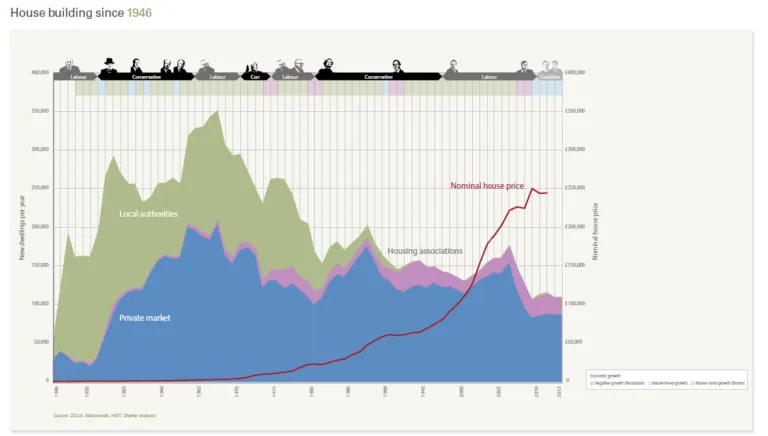Building the homes we need
Published: by Pete Jefferys
If you’re a reader of Shelter’s policy blog then you’ll know that England faces a housing shortage and that increasingly it’s a big issue of public concern. Today, KPMG in the UK and Shelter jointly publish new analysis on the scale of the problem, the potential consequences of doing nothing and a programme for whoever forms the next government that would get us building enough homes.
While today we’ve highlighted the risks of inaction, there is a clearly also an opportunity for politicians who can show they take this problem seriously. Housing has been polling as a top five issue of concern for voters nationally, above crime, education and Europe. Polling also shows that no one party has a clear lead: 39% of people say “none” when asked which party they trust most on housing.
Each year we are building at least 100,000 fewer homes than we need, on top of an existing housing shortage that has been decades in the making. As more people look for a place they can afford to live the pressure will only grow. Without a step change in how many homes we build, we will find ourselves locked into a spiral of rising rents, long waiting lists for affordable rented homes and home ownership further out of reach for many families who work and save.
Shelter has partnered with housing industry experts at KPMG to offer a long term, serious plan to get England building the homes we need. Our programme of tough reforms, smarter investment and local leadership would see England building close to the 250,000 homes per year we need by the end of the next parliament.
Crucially, our programme locks in reforms that make home building sustainable in the long term and would deliver a high proportion of affordable homes, including for low cost social rent. Too often, housing policies have a short term hit for a lucky few but only work by inflating house prices or cashing out on the value of existing homes. After years of house price inflation and declining affordable housing we’ve run out of road with that approach. There simply aren’t any easy answers left and the public knows it.
To deliver our plan, whoever forms the 2015 government would need to face up to four major challenges:
Tackling the high cost of land, which strangles the quality, size and affordability of new homes. Reform is needed to make it possible to build affordable, attractive homes as well as local transport and services without all the investment being sucked into ever higher land prices. We recommend Dutch and German style development corporations, which can be self-financing and bring in the private sector to lead on delivery.
Creating a diverse, resilient house building industry that can build enough high quality homes. Helping local builders to access plots of land and development finance can transform our house building sector, create jobs and apprenticeships and give consumers much more say over the type of home being built.
Being smart about long term investment, from both institutional investors and central and local government. Some extra public investment is needed, but with reform the cost can be kept down. With a challenging fiscal position after 2015, the next government will also need to look at new ideas to leverage more private investment into home.
Devolving powers and budgets to cities and towns which want to grow, but also challenging local politicians to work collaboratively across their boundaries. The geography of any home building plan is obviously crucial. Running everything from Whitehall could create major opposition while devolving all power to the most local level makes it harder to plan the new places we desperately need.
Over the next few weeks we will write about how each of these challenges can be met by the recommendation in our report.
Our analysis suggests that to tackle the housing shortage, a comprehensive programme will be needed, rather than piece-meal schemes or a “silver bullet” policy, such as a major spending programme or a fundamental re-think of the planning system.
There is also a major political opportunity. The public currently don’t know who to trust on housing – which is not surprising given no-one has yet committed clearly and publically to taking the tough decisions needed. Whoever can come up with a credible response to tackling the housing shortage could reap major benefits – at this election and the next if their plan is successful too.
Building the homes we need won’t be easy and it won’t be cost free. However with the right reform it absolutely is possible to start tackling this major national problem within a parliament, and without unaffordable spending commitments. Let’s get on with it.
Read more about our proposals thehomesweneed.org.uk
